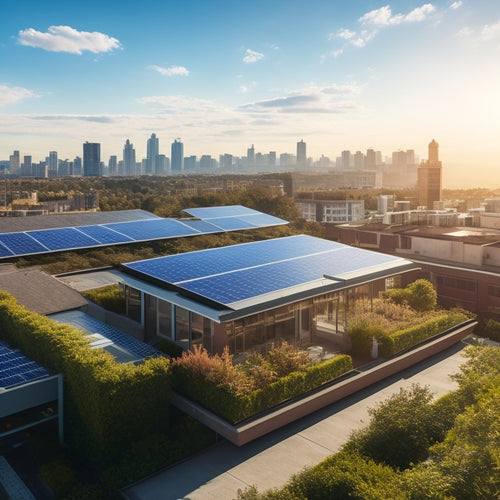
Solar Energy Storage System for a Sustainable Future
Share
You can utilize the full potential of solar energy by incorporating a storage system that guarantees a steady power supply when sunlight is unavailable, capturing excess energy generated by solar panels for later use. This reliable energy supply prevents interruptions in power, contributes to grid stability, and enables peak shaving, reducing energy bills and carbon footprint. With various types of solar energy storage options available, including lithium batteries, flow batteries, and hybrid systems, you can choose the one that suits your needs. As you examine the benefits and importance of solar energy storage, you'll uncover how it can play an essential role in creating a sustainable future for generations to come.
Key Takeaways
- Solar energy storage systems ensure a steady power supply when sunlight is unavailable, capturing excess energy for later use and enabling grid integration.
- Advanced battery technologies, such as lithium-ion and flow batteries, are crucial for efficient energy storage and release in solar energy systems.
- Solar energy storage contributes to grid stability, promotes energy independence, and supports sustainability goals by minimizing fossil fuel dependency.
- Smart grid integration with solar energy storage enables real-time energy management, demand response strategies, and a more reliable and efficient energy system.
- Energy storage systems reduce greenhouse gas emissions, optimize energy production and consumption, and drive innovation in green technology, fostering economic growth.
What Is Solar Energy Storage
As you consider utilizing solar energy, you're likely wondering how to guarantee a steady supply of power when the sun isn't shining. This is where solar energy storage comes in – a vital component of a reliable and efficient solar power system.
Solar energy storage systems enable you to capture excess energy generated by your solar panels during the day and store it for later use, providing a stable power supply when the sun isn't shining.
At the heart of solar energy storage are solar batteries, designed to store electrical energy for extended periods. These advanced batteries are capable of deep discharge, allowing you to tap into the stored energy when needed.
Grid integration is another key aspect of solar energy storage, enabling you to feed excess energy back into the grid and offset your energy consumption during periods of low solar radiation.
Benefits of Energy Storage Systems
Reliability is key when it comes to your energy supply, and that's exactly what solar energy storage systems provide. With a reliable energy supply, you can power your home or business without interruptions, ensuring your daily operations run smoothly.
Energy storage systems also contribute to grid stability by storing excess energy generated during the day and releasing it when needed, reducing the strain on the grid during peak hours. This process, known as peak shaving, helps to reduce your energy bills and carbon footprint.
By investing in energy storage, you're not only reducing your environmental impact but also achieving energy independence. Additionally, advancements in technology have led to more efficient systems, allowing you to maximize your energy output.
Policy incentives and demand response programs further encourage the adoption of energy storage systems, making them a viable option for those seeking a sustainable future.
Types of Solar Energy Storage
Your solar energy storage system's performance hinges on the type of storage technology you choose, and you have several options to evaluate. Each type has its unique characteristics, advantages, and limitations.
-
Lithium Batteries: Known for their high energy density and long cycle life, lithium batteries are a popular choice. However, they can be expensive and have moderate discharge rates.
-
Flow Batteries: With a lower energy density, flow batteries compensate with a longer cycle life and lower installation challenges. They're ideal for long-duration energy storage.
-
Thermal Storage: This technology stores energy by heating or cooling a medium, making it suitable for concentrated solar power (CSP) systems. It's ideal for large-scale applications.
-
Pumped Storage: By storing energy in the form of water, pumped storage systems offer high discharge rates and long cycle life. They're often used for grid-scale applications.
-
Hybrid Systems: Combining different storage technologies, hybrid systems offer flexibility and optimized performance. They require sophisticated battery management systems to guarantee seamless operation.
When selecting a storage technology, consider factors like energy density, cycle life, discharge rates, and installation challenges to guarantee your solar energy storage system meets your specific needs.
How Solar Energy Storage Works
One essential aspect of utilizing solar energy is understanding how solar energy storage works. You're likely aware that solar panels convert sunlight into electricity, but what happens when the sun isn't shining? That's where solar energy storage comes in. It involves storing excess energy generated during the day for use during the night or on cloudy days.
The process begins with charging your solar battery during the day. As your solar panels produce electricity, it's fed into the battery, which stores the energy for later use.
When the sun sets or on cloudy days, your solar energy storage system kicks in, providing a steady flow of power to your home or business. Recent solar technology advancements and battery efficiency improvements have made this process more efficient and cost-effective.
With a well-designed solar energy storage system, you can enjoy a reliable and sustainable source of power, reducing your reliance on the grid and minimizing your carbon footprint.
Importance of Sustainable Energy
Switching to sustainable energy is an essential step in mitigating climate change, and it starts with understanding the significance of sustainable energy. As you consider the importance of sustainable energy, you'll realize that it's not just a moral obligation, but a necessary step towards a secure future.
Here are the key reasons why sustainable energy matters:
-
Reduced environmental impact: Sustainable energy sources like solar and wind power reduce greenhouse gas emissions, minimizing their contribution to climate change.
-
Energy efficiency: Sustainable energy systems optimize energy production and consumption, reducing waste and promoting energy independence.
-
Renewable resources: Sustainable energy relies on renewable resources, ensuring a consistent supply of energy without depleting natural resources.
-
Green technology advancements: The shift to sustainable energy drives innovation in green technology, creating new opportunities for economic growth and development.
-
Community engagement and policy implications: Sustainable energy initiatives encourage community engagement and inform policy decisions, promoting a collective commitment to a sustainable future.
Solar Energy Storage Cost Factors
The cost of a solar energy storage system is a critical factor in its adoption, as it directly impacts the return on investment and feasibility of the project.
As you consider implementing a solar energy storage system, you'll need to evaluate several cost factors. Battery efficiency, for instance, plays a significant role in determining the overall cost of the system. A more efficient battery will reduce the required capacity, resulting in lower upfront costs.
Grid integration costs, including the installation of inverters and grid connection infrastructure, are also a significant expense. However, investment incentives and technology advancements are helping to drive down costs.
Maintenance costs, system scalability, and market competition are additional factors that can impact the overall cost of the system. Additionally, regulatory policies, such as tax credits and net metering laws, can also influence the cost of solar energy storage.
Future of Renewable Energy Systems
As you look to the future of renewable energy systems, you'll notice emerging trends that prioritize decentralized power generation and community-scale energy storage.
These shifts will drive innovation in energy storage solutions, enabling more efficient and resilient renewable energy systems.
You can expect advancements in battery technologies, smart grids, and hybrid power plants to play an essential role in shaping the future of renewable energy.
Renewable Energy Trends
Over 10 million households worldwide have already shifted to renewable energy systems, and this number is expected to skyrocket in the coming years.
As you consider investing in a solar energy storage system, it's crucial to understand the trends driving the renewable energy sector. You're likely aware that solar incentives and energy policies are becoming more favorable, driving growth in the industry.
Here are some key trends shaping the future of renewable energy systems:
-
Technological advancements are improving energy efficiency and reducing costs, making renewable energy more competitive with fossil fuels.
-
Grid integration is becoming more seamless, enabling greater adoption of intermittent renewable energy sources.
-
Environmental impacts are becoming a major concern, leading to increased consumer awareness and demand for sustainable energy solutions.
-
Market competition is heating up, driving innovation and reducing prices for renewable energy systems.
-
Energy storage is becoming a critical component of renewable energy systems, enabling greater reliability and flexibility.
These trends are creating a perfect storm of growth and innovation in the renewable energy sector, and you're equipped to benefit from them by investing in a solar energy storage system.
Energy Storage Solutions
Solar energy storage systems are becoming increasingly essential to the future of renewable energy systems. As you consider integrating solar energy into your power infrastructure, you'll need a reliable way to store excess energy generated during the day for use during periods of low sunlight or at night. This is where energy storage solutions come in.
You'll want to investigate advanced battery technologies that can efficiently store and release electrical energy. These include lithium-ion batteries, lead-acid batteries, and flow batteries, each with their own strengths and weaknesses.
Smart grids, which can manage energy distribution in real-time, will also play a critical role in optimizing energy storage and release. By combining these technologies, you can guarantee a stable and efficient energy supply.
With energy storage solutions, you'll be able to tap into the full potential of solar energy, reducing your reliance on fossil fuels and mitigating the impact of variable energy sources.
Frequently Asked Questions
Can I Use Solar Energy Storage for My Business or Just Home?
You can definitely use solar energy storage for your business, not just home, as it offers commercial applications that provide energy independence, reducing reliance on the grid and lowering operational costs.
How Long Does a Typical Solar Energy Storage System Last?
You can expect a typical solar energy storage system to last around 15-20 years, with lifetime expectations varying depending on factors like battery type and usage, as battery degradation occurs over time, affecting overall system performance.
Can I Install a Solar Energy Storage System Myself?
Back in the day, DIY enthusiasts would've thought you're out of your mind, but today, you can install a solar energy storage system yourself, steering through installation challenges with DIY tips like proper grounding and battery placement.
Are Solar Energy Storage Systems Covered by Warranties?
You'll typically find that solar energy storage systems come with warranty coverage, ensuring system longevity and protecting your investment; manufacturers usually offer warranties ranging from 5 to 15 years, depending on the specific product and brand.
Do Solar Energy Storage Systems Require Regular Maintenance?
You're wondering if your investment requires constant attention, and the answer is yes, regular maintenance is essential to guarantee ideal battery performance; follow these maintenance tips to prevent degradation and extend lifespan.
Related Posts
-

Charging Points in Rural Areas: 5 Key Insights
When driving through rural areas, you'll face a shortage of charging points, making EV ownership stressful and inconv...
-

Master Advanced Solar Panel Design Online for Free
You can master advanced solar panel design online for free by leveraging specialized courses and training platforms, ...
-

What Is the Cost to Put in Solar Panels
You're likely considering solar panels for your home, and the most significant factor in your decision is the upfront...


